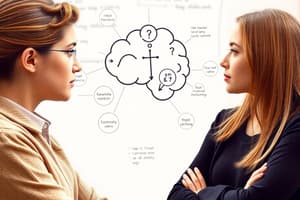Podcast
Questions and Answers
What is a characteristic of successful learners?
What is a characteristic of successful learners?
- They assume personal responsibility for their learning. (correct)
- They rely solely on educators for guidance.
- They avoid setting any learning goals.
- They are passive in their learning processes.
How can educators assist learners in achieving their goals?
How can educators assist learners in achieving their goals?
- By helping them create meaningful learning goals. (correct)
- By providing only theoretical knowledge without practical application.
- By setting fixed performance expectations without flexibility.
- By discouraging personal interests in learning.
What happens if new knowledge is not integrated with existing knowledge?
What happens if new knowledge is not integrated with existing knowledge?
- New knowledge becomes obsolete quickly.
- New knowledge enhances prior understanding.
- New knowledge remains isolated and cannot be used effectively. (correct)
- New knowledge is easily transferred to new tasks.
Which strategy can successful learners use to achieve complex goals?
Which strategy can successful learners use to achieve complex goals?
What role does reflection play in learning according to the content provided?
What role does reflection play in learning according to the content provided?
What is a crucial aspect of the strategic nature of learning?
What is a crucial aspect of the strategic nature of learning?
Which approach can enhance learning outcomes for students?
Which approach can enhance learning outcomes for students?
How does construction of knowledge occur in successful learners?
How does construction of knowledge occur in successful learners?
What is essential for effective learning to occur according to the principles outlined?
What is essential for effective learning to occur according to the principles outlined?
Which principle emphasizes the importance of one's existing knowledge in the learning process?
Which principle emphasizes the importance of one's existing knowledge in the learning process?
How is intrinsic motivation characterized in the context of learning?
How is intrinsic motivation characterized in the context of learning?
What is emphasized about learner differences in the educational principles?
What is emphasized about learner differences in the educational principles?
What aspect is crucial for selecting instructional materials based on the learner's needs?
What aspect is crucial for selecting instructional materials based on the learner's needs?
What factor significantly enhances learning effectiveness?
What factor significantly enhances learning effectiveness?
How do social influences enhance learning?
How do social influences enhance learning?
Why is it important to consider individual differences in learning?
Why is it important to consider individual differences in learning?
What is a key characteristic of effective learning environments?
What is a key characteristic of effective learning environments?
What role does learner motivation play in the learning process?
What role does learner motivation play in the learning process?
How can social competence in learning be enhanced?
How can social competence in learning be enhanced?
What is the impact of taking individual differences into account in learning?
What is the impact of taking individual differences into account in learning?
What type of instructional setting is beneficial for cognitive and moral development?
What type of instructional setting is beneficial for cognitive and moral development?
What is primarily emphasized in Learner-Centered Psychological Principles?
What is primarily emphasized in Learner-Centered Psychological Principles?
How many principles are identified in the Learner-Centered Psychological Principles?
How many principles are identified in the Learner-Centered Psychological Principles?
The principles of Learner-Centered Psychological Principles apply to which groups?
The principles of Learner-Centered Psychological Principles apply to which groups?
Which factors are NOT one of the categories influencing learning according to the principles?
Which factors are NOT one of the categories influencing learning according to the principles?
What is the intended approach of the principles towards learners?
What is the intended approach of the principles towards learners?
Which of these is an example of a Cognitive and Metacognitive Factor?
Which of these is an example of a Cognitive and Metacognitive Factor?
What aspect of the learning process do the principles advocate for?
What aspect of the learning process do the principles advocate for?
Which of the following factors is primarily associated with the Motivation and Affective category?
Which of the following factors is primarily associated with the Motivation and Affective category?
What do successful learners do when they encounter problems in their learning progress?
What do successful learners do when they encounter problems in their learning progress?
Which of the following is a major influence on learner motivation according to emotional factors?
Which of the following is a major influence on learner motivation according to emotional factors?
What role do teachers play in the learning environment?
What role do teachers play in the learning environment?
How can intrinsic motivation be facilitated among learners?
How can intrinsic motivation be facilitated among learners?
What can impact student learning significantly aside from teaching methods?
What can impact student learning significantly aside from teaching methods?
Which type of motivation enhances creativity and curiosity in learners?
Which type of motivation enhances creativity and curiosity in learners?
What kind of classroom environment is likely to most benefit student learning?
What kind of classroom environment is likely to most benefit student learning?
Which of the following factors contributes to the motivation to learn?
Which of the following factors contributes to the motivation to learn?
Flashcards are hidden until you start studying
Study Notes
Learner-Centered Psychological Principles (LCP)
- Developed by the American Psychological Association; focus on the learner and learning processes.
- Internal psychological factors and external contextual factors shape learning experiences.
- Principles should be viewed holistically, engaging with real-world learning scenarios.
Categories of Principles
- Cognitive and Metacognitive Factors
- Motivational and Affective Factors
- Developmental and Social Factors
- Individual Differences Factors
Cognitive and Metacognitive Factors
- Nature of Learning: Successful learning is intentional, focusing on constructing meaning from experiences.
- Goals of Learning: Students develop coherent knowledge representations with educator support, guided by personal goals.
- Construction of Knowledge: Linking new information to prior knowledge enhances understanding and transferability.
- Strategic Thinking: Successful learners use various thinking strategies, reflecting on their efficacy and adapting as needed.
- Thinking About Thinking: Reflective strategies help learners to set goals, monitor progress, and adapt problem-solving approaches.
- Context of Learning: Environmental factors, including culture and instructional practices, significantly influence learning.
Motivational and Affective Factors
- Motivational Influences: Motivation is crucial for learning; emotional states and personal beliefs can affect academic performance.
- Intrinsic Motivation: Stimulated by relevant and challenging tasks, fostering creativity and higher-order thinking.
- Motivation and Effort: Longer engagement and effort are necessary for mastering complex skills; relevance and interest in tasks are key.
Developmental and Social Factors
- Developmental Influences: Learning effectiveness varies with individuals' developmental stages; materials should align with their abilities.
- Social Influences: Social interactions enrich learning; diverse, collaborative settings encourage cognitive and moral development.
Individual Differences Factors
- Individual Differences: Learners have diverse strategies and abilities influenced by genetics and experiences; pedagogical sensitivity is necessary.
- Learning and Diversity: Acknowledging linguistic, cultural, and social variations enhances motivation and achievement; personalized approaches are critical.
- Standards and Assessment: High standards and effective assessments, including diagnostic techniques, are essential for optimal learning outcomes.
Summary of the 14 Principles
- Knowledge Base: Prior knowledge lays the groundwork for future learning.
- Strategic Processing: Development of skills for regulating thoughts and behaviors is essential.
- Motivation and Affect: Intrinsic motivation plays a significant role in learning efficacy.
- Development and Individual Differences: Each learner's background influences their learning journey.
- Learning Context: Education occurs within a societal framework and individual experiences.
Studying That Suits You
Use AI to generate personalized quizzes and flashcards to suit your learning preferences.




